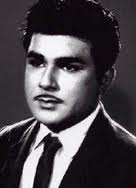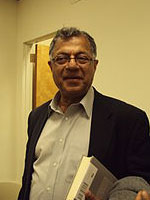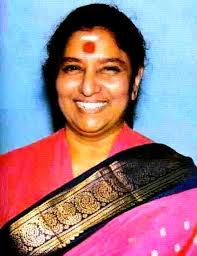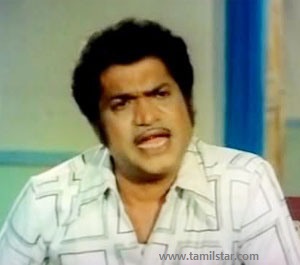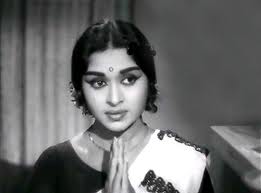
Showing all artists born in 1938
Kumarimuthu
Kumarimuthu (20 December 1938– 28 February 2016) was a Tamil film actor comedian and politician of the Dravida Munnetra Kazhagam (DMK). He was known for his unique comical laugh.
Kumarimuthu was a member of Nadigar Sangam and was involved in a controversy where he was expelled from the Nadigar Sangam over allegations of speaking negatively about the association, after he questioned the intent behind the land lease and building demolition. He died at the age of 77 on 28 February 2016 due to age-related ailments.
Kumarimuthu was a member of Nadigar Sangam and was involved in a controversy where he was expelled from the Nadigar Sangam over allegations of speaking negatively about the association, after he questioned the intent behind the land lease and building demolition. He died at the age of 77 on 28 February 2016 due to age-related ailments.
Known For:
Thirupaachi
, Viralukketha Veekkam
, Ettupatti Rasa
, Gopala Gopala
, Sengottai
, Meendum Savithri
, Nattupura Pattu
, Kolangal
, Thamizhachi
, Paattu Vaathiyar
, Oru Oorla Oru Rajakumari
, Sathyavan
, Porantha Veeda Puguntha Veeda
, Cheran Pandiyan
, Irumbu Pookkal
, Pudhu Vasantham
, Chinna Poove Mella Pesu
, Aruvadai Naal
, December Pookal
, Kozhi Koovuthu
Jaishankar
Jaishankar was an actor in Tamil cinema. He is sometimes referred to as the Thennagathu James Bond (South Indian James Bond) because of his dashing roles in films such as Vallavan Oruvan and CID Shankar.
Jaishankar was called Subramaniam Shankar at birth, on 12 July 1938. His father was a magistrate, and Jaishankar was educated at PS High School and The New College, Chennai, where he was awarded an honours degree. He studied law but gave it up after a year because of his interests in the theater and other art forms.
He joined Cho's Viveka Fine Arts, which consisted mostly of Mylaporeans where he did insignificantly small roles. Obviously not happy he moved out and the break came with Koothabiran's Kalki Fine Arts where he made a mark playing a lead role in Kalki's 'Amara Thaara'.
In an era dominated by ... See full bio
Jaishankar was called Subramaniam Shankar at birth, on 12 July 1938. His father was a magistrate, and Jaishankar was educated at PS High School and The New College, Chennai, where he was awarded an honours degree. He studied law but gave it up after a year because of his interests in the theater and other art forms.
He joined Cho's Viveka Fine Arts, which consisted mostly of Mylaporeans where he did insignificantly small roles. Obviously not happy he moved out and the break came with Koothabiran's Kalki Fine Arts where he made a mark playing a lead role in Kalki's 'Amara Thaara'.
In an era dominated by ... See full bio
Known For:
Arunachalam
, Kaalamellam Kaathiruppen
, Kathirunda Kadhal
, Subash
, Chandralekha
, Vishnu
, Paattu Vaathiyar
, Priyanka
, Varavu Ettana Selavu Pathana
, Airport
, Gokulam
, Singaravelan
, Thalapathi
, Mounam Sammadham
, Ponmana Selvan
, Apoorva Sagodharargal
, Thaai Naadu
, Naalaiya Manithan
, En Jeevan Paduthu
, Enga Ooru Pattukaran
, Kadhal Parisu
, Oomai Vizhigal
, Pillai Nila
, Neethiyin Marupakkam
, Poove Poochooda Vaa
, Anbulla Rajinikanth
, Alaya Deepam
, Vidhi
, Adutha Varisu
, Thanikattu Raja
, Vazhvey Maayam
, Apoorva Raagangal
Girish Raghunath
Girish Raghunath Karnad (Kannada: ಗಿರೀಶ್ ಕಾರ್ನಾಡ್; born 19 May 1938) is a contemporary writer, playwright, screenwriter, actor and movie director in Kannada language. His rise as a playwright in 1960s, marked the coming of age of modern Indian playwriting in Kannada, just as Badal Sarkar did in Bengali, Vijay Tendulkar in Marathi, and Mohan Rakesh in Hindi. He is a recipient of the 1998 Jnanpith Award, the highest literary honour conferred in India.[2]
For four decades Karnad has been composing plays, often using history and mythology to tackle contemporary issues. He has translated his plays into English and has received acclaim.[3] His plays have been translated into some Indian languages and directed by directors like Ebrahim Alkazi, B. V. Karanth, Alyque Padamsee, P... See full bio
For four decades Karnad has been composing plays, often using history and mythology to tackle contemporary issues. He has translated his plays into English and has received acclaim.[3] His plays have been translated into some Indian languages and directed by directors like Ebrahim Alkazi, B. V. Karanth, Alyque Padamsee, P... See full bio
S. Janaki
Sishtla Sreeramamurthy Janaki, commonly known as S. Janaki, is an Indian playback singer. Janaki has sung nearly 20,000 songs, encompassing most of the languages of South India, during a career that has lasted over 50 years. She has won four National Film Awards and 31 different State Film Awards. Her association with singer S. P. Balasubramanyam and composer Ilaiyaraaja is among the most popular musical combinations in South India.
She is known as, "The Nightingale of the South". She is a recipient of a Honorary doctorate from the University of Mysore and the Kalaimamani award from Tamil Nadu State Government. In 2013, she refused the offer of a Padma Bhushan award by the Government of India, saying that it had come too late and that South Indian artists were not given their due recognition.S. Janaki was born in a Telugu-speaking Brahmin family in P... See full bio
She is known as, "The Nightingale of the South". She is a recipient of a Honorary doctorate from the University of Mysore and the Kalaimamani award from Tamil Nadu State Government. In 2013, she refused the offer of a Padma Bhushan award by the Government of India, saying that it had come too late and that South Indian artists were not given their due recognition.S. Janaki was born in a Telugu-speaking Brahmin family in P... See full bio
Known For:
Suruli Rajan
Suruli Rajan was a Tamil film comedian/character artiste. He was a recipient of Tamil Nadu State Government's Best Comedian Award for the year 1981–82.
Biography
Suruli Rajan was born in 1938 in Periyakulam, near Theni. His father Ponniah Pillai worked as an accountant for farm owners of the adjoining areas in Theni. The child was named after the Suruli Velappar, the family deity at the temple atop a hill graced by the picturesque Suruli Falls.
Suruli Rajan lost his parents one after the other, and had to discontinue his schooling. He moved to his brother's house in Madurai and worked as an apprentice mechanic in a neighbourhood workshop. Bitten by the acting bug, he acted in several amateur stage plays in Madurai before moving to Madras in 1959 in search of greener pastures.
See full bio
Biography
Suruli Rajan was born in 1938 in Periyakulam, near Theni. His father Ponniah Pillai worked as an accountant for farm owners of the adjoining areas in Theni. The child was named after the Suruli Velappar, the family deity at the temple atop a hill graced by the picturesque Suruli Falls.
Suruli Rajan lost his parents one after the other, and had to discontinue his schooling. He moved to his brother's house in Madurai and worked as an apprentice mechanic in a neighbourhood workshop. Bitten by the acting bug, he acted in several amateur stage plays in Madurai before moving to Madras in 1959 in search of greener pastures.
See full bio
Known For:
Johnny
Saroja Devi
B. Saroja Devi is an Indian actress. She has acted in Kannada, Tamil, Telugu and Hindi movies. She is referred to as "Abinaya Saraswathi" by Kannada film industry and as "Kannadathu Paingili" (meaning Kannada's Parrot) by Tamil Film Industry. She has acted in nearly 200 films in a period of more than three decades. Saroja Devi is one of the most successful female film stars in the history of Indian cinema and she was at her peak as the main female lead in films in the period 1958-85.Saroja Devi received Padma Bhushan, third highest civilian award, in 2002 and in 1969, she was honoured with the Padma Sri, the fourth-highest civilian honour, by the Government of India.
Saroja Devi was born in Karnataka on 7 January 1938 to Bhairappa and Rudramma. Her father worked for the police department. Saroja Devi was their fourth daughter. But... See full bio
Saroja Devi was born in Karnataka on 7 January 1938 to Bhairappa and Rudramma. Her father worked for the police department. Saroja Devi was their fourth daughter. But... See full bio

